House of Cards' Final Season Is About Women Gaining Power—at the Expense of Other Women

Corruption runs so deep on House of Cards that its major characters can, at times, seem comically evil. It takes an honest, kind, and unpretentious character to remind the viewer how genuinely frightening it must be to work alongside power-obsessed politicians. In the sixth—and final—season, now on Netflix, that character is Kelsey Stewart, a White House tour guide who becomes Claire Underwood’s press secretary and whose regard for Claire begins in awe and evolves into fear. (Caution: Spoilers ahead.)
Kristen Sieh, the actor who plays Kelsey, tells Glamour that House of Cards’ showrunners (Melissa James Gibson and Frank Pugliese) specifically wanted Kelsey to be at the opposite ethical pole from Claire. “Melissa and Frank were saying to me that Kelsey is the only person with a heart in the show,” Sieh explains, with a laugh.
Claire and Kelsey’s personal lives are entangled this season based on a mutual connection to Tom Yates, Claire’s former lover who last season engaged in an impromptu act of intimacy with Kelsey in the White House press room. Kelsey’s naivety in handling the incident puts her in peril when Claire convinces her to take down the Vice President by falsely linking him to Tom’s death, an event that Claire herself caused. With convincing pathos, she tells Kelsey, “I’m not going to let the Vice President get away with this. You and I as women—we have to fight back. I need you by my side.”
Women’s anger and retaliation is a dominant theme in the show’s final season, and Claire Underwood (well, actually, Claire Hale—she uses her maiden name as president) is determined to make the White House a place for women to flourish in place of the men who, in Claire’s view, resent the very idea of a female president. She promotes Kelsey to press secretary and installs an all-female cabinet, all while making asides to the camera, as only a House of Cards anti-hero can, that she’ll undermine these female colleagues as she sees fit. In a complicated twist of feminism, Claire helps women advance politically by keeping them on the tightest of leashes.
PHOTO: David Giesbrecht/Netflix
Devious as Claire is, Sieh believes that female villains like her are still worth celebrating. “I think it’s beautiful to watch women step into these roles that we love to hate. The scenes between Patricia Clarkson and Robin [Wright] are some of the most exciting moments of television that I’ve watched in a long time. And Diane Lane—she ends up plotting the assassination of the president. The most interesting part about feminism in this season is that power is the corrupter. Power and tyranny come in all the different forms imaginable,” she says.
When Kevin Spacey was removed from the show and Robin Wright took his place as star, many viewers noted that Claire was the more interesting Underwood all along. Her unshakeable focus and cold-as-ice demeanor were fascinating to watch, in part because they existed in the shadow of her husband. It wasn’t until the latter half of season five that Claire’s ambition surged past Frank toward the Oval Office. Now, in the show’s final season, Claire holds the reigns. But her presidency is exemplified by the same cruel narcissism as with her predecessor—only this time, those ominous footsteps you hear through the West Wing hallways are not the clomps of Frank’s wingtips, but the taps of Claire’s heels.
“Something I love about this season is the tropes of femininity,” Sieh says. “Like loving bags and hair and clothes—all these tribal ideas are turned on their heads.” In one climactic scene, Claire gives a Kelsey a purse while announcing that Kelsey’s role as press secretary will be temporarily silenced so Claire can control the messaging from the White House. “She hands me a purse,” Sieh says. “It’s the same purse [Claire] brought when she poisoned Tom Yates. For Kelsey, there’s this absurdity of a hyper-feminine interaction with Claire, who’s this bulldog.”

PHOTO: David Giesbrecht/Netflix
That scene, in which Claire says icily, “I’ll let you know when you need to speak,” leaves Kelsey stunned and heartbroken at realizing the true nature of her boss. With so much villainy, what is the show saying about a president who empowers women while underhandedly controlling them? Is empowerment even the right word?
“I think it is,” Sieh says. “How you behave or allow yourself to be manipulated or not, or keep your ideals intact, that’s the personal journey. But just being in the room is incredibly important.” In other words, Kelsey would eventually wizen up and figure out the system. “That’s where you get wisdom.”
When we speak, it’s the day before the midterm elections, and Sieh turns her thoughts to female representation in Washington. “I was just looking up how many female congresswomen there are,” she says. “There are only 23 female senators and only four women of color.” Within a day, more than 100 women would win seats in Congress, representing an array of ethnicities, religions, and sexual orientations. With hope, they’ll blend some of Claire’s savviness and Kelsey’s integrity. Surely both characters would be happy to hear more of those tapping sounds through the halls of Congress.
Related: Twitter Is More Than Happy That Claire Underwood Is Taking Over House of Cards





